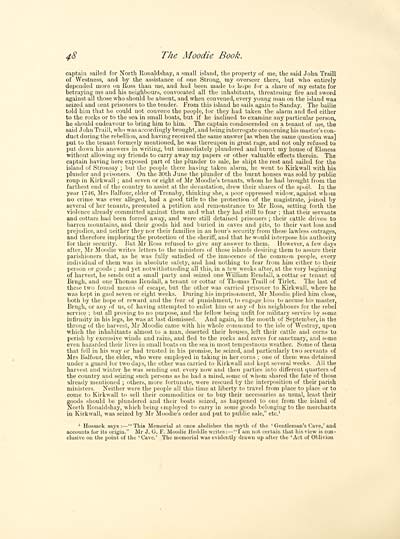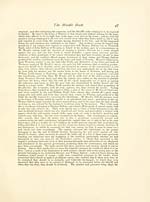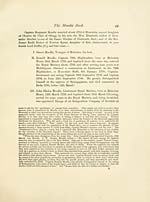Moodie book
(78) Page 48
Download files
Complete book:
Individual page:
Thumbnail gallery: Grid view | List view

4 8
The Moodie Book.
captain sailed for North Ronaldshay, a small island, the property of me, the said John Traill
of Westness, and by the assistance of one Strong, my overseer there, but who entirely
depended more on Ross than me, and had been made to hope for a share of my estate for
betraying me and his neighbours, convocated all the inhabitants, threatening fire and sword
against all those who should be absent, and when convened, every young man on the island was
seized and sent prisoners to the tender. From this island he sails again to Sanday. The bailie
told him that he could not convene the people, for they had taken the alarm and fled either
to the rocks or to the sea in small boats, but if he inclined to examine any particular person,
he should endeavour to bring him to him. The captain condescended on a tenant of me, the
said John Traill, who was accordingly brought, and being interrogate concerning his master's con-
duct during the rebellion, and having received the same answer [as when the same question was]
put to the tenant formerly mentioned, he was thereupon in great rage, and not only refused to
put down his answers in writing, but immediately plundered and burnt my house of Elsness
without allowing my friends to carry away my papers or other valuable effects therein. The
captain having here exposed part of the plunder to sale, he shipt the rest and sailed for the
island of Stronsay ; but the people there having taken alarm, he went to Kirkwall with his
plunder and prisoners. On the 30th June the plunder of the burnt houses was sold by public
roup in Kirkwall ; and seven or eight of Mr Moodie's tenants, whom he had brought from the
farthest end of the country to assist at the devastation, drew their shares of the spoil. In the
year 174(3, Mrs Balfour, elder of Trenaby, thinking she, a poor oppressed widow, against whom
no crime was ever alleged, had a good title to the protection of the magistrate, joined by
several of her tenants, presented a petition and remonstrance to Mr Ross, setting forth the
violence already committed against them and what they had still to fear ; that their servants
and cottars had been forced away, and were still detained prisoners ; their cattle driven to
barren mountains, and their goods hid and buried in caves and pits, to their vast loss and
prejudice, and neither they nor their families in an hour's security from these, lawless outrages,
and therefore imploring the protection of the sheriff, and that he would interpose his authority
for their security. But Mr Ross refused to give any answer to them. However, a few days
after, Mr Moodie writes letters to the ministers of these islands desiring them to assure their
parishioners that, as he was fully satisfied of the innocence of the common people, every
individual of them was in absolute safety, and had nothing to fear from him either to their
person or goods ; and yet notwithstanding all this, in a lew weeks after, at the very beginning
of harvest, he sends out a small party and seized one William Kendall, a cottar or tenaut of
Brugh, and one Thomas Kendall, a tenant or cottar of Thomas Traill of Tirlet. The last of
these two found means of escape, but the other was carried prisoner to Kirkwall, where he
was kept in gaol seven or eight weeks. During his imprisonment, Mr Moodie plied him close,
both by the hope of reward and the fear of punishment, to engage him to accuse his master,
Brugh, or any of us, of having attempted to enlist him or any of his neighbours for the rebel
service ; but all proving to no purpose, and the fellow being unfit for military service by some
infirmity in his legs, he was at last dismissed. And again, in the month of September, in the
throng of the harvest, Mr Moodie came with his whole command to the isle of Westray, upon
which the inhabitants almost to a man, deserted their houses, left their cattle and corns to
perish by excessive winds and rains, and fled to the rocks and caves for sanctuary, and some
even hazarded their lives in small boats on the sea in most tempestuous weather. Some of them
that fell in his way or had trusted in his promise, he seized, and particularly two servants of
Mrs Balfour, the elder, who were employed in taking in her corns ; one of them was detained
under a guard for two days, the other was carried to Kirkwall and kept several weeks. All the
harvest and winter he was sending out every now and then parties into different quarters of
the country and seizing such persons as he had a mind, some of whom shared the fate of those
already mentioned ; others, more fortunate, were rescued by the interposition of their parish
ministers. Neither were the people all this time at liberty to travel from place to place or to
come to Kirkwall to sell their commodities or to buy their necessaries as usual, least their
goods should be plundered and their boats seized, as happened to one from the island of
North Ronaldshay, which being employed to carry in some goods belonging to the merchants
in Kirkwall, was seized by Mr Moodie's order and put to public sale," etc. 1
1 Hossack says: — "This Memorial at once abolishes the myth of the ' Gentleman's Cave,' and
accounts for its origin." Mr J. G. F. Moodie Heddle writes: — "I am not certain that his view is con-
elusive on the point of the ' Cave.' The memorial was evidently drawn up after the 'Act of Oblivion
The Moodie Book.
captain sailed for North Ronaldshay, a small island, the property of me, the said John Traill
of Westness, and by the assistance of one Strong, my overseer there, but who entirely
depended more on Ross than me, and had been made to hope for a share of my estate for
betraying me and his neighbours, convocated all the inhabitants, threatening fire and sword
against all those who should be absent, and when convened, every young man on the island was
seized and sent prisoners to the tender. From this island he sails again to Sanday. The bailie
told him that he could not convene the people, for they had taken the alarm and fled either
to the rocks or to the sea in small boats, but if he inclined to examine any particular person,
he should endeavour to bring him to him. The captain condescended on a tenant of me, the
said John Traill, who was accordingly brought, and being interrogate concerning his master's con-
duct during the rebellion, and having received the same answer [as when the same question was]
put to the tenant formerly mentioned, he was thereupon in great rage, and not only refused to
put down his answers in writing, but immediately plundered and burnt my house of Elsness
without allowing my friends to carry away my papers or other valuable effects therein. The
captain having here exposed part of the plunder to sale, he shipt the rest and sailed for the
island of Stronsay ; but the people there having taken alarm, he went to Kirkwall with his
plunder and prisoners. On the 30th June the plunder of the burnt houses was sold by public
roup in Kirkwall ; and seven or eight of Mr Moodie's tenants, whom he had brought from the
farthest end of the country to assist at the devastation, drew their shares of the spoil. In the
year 174(3, Mrs Balfour, elder of Trenaby, thinking she, a poor oppressed widow, against whom
no crime was ever alleged, had a good title to the protection of the magistrate, joined by
several of her tenants, presented a petition and remonstrance to Mr Ross, setting forth the
violence already committed against them and what they had still to fear ; that their servants
and cottars had been forced away, and were still detained prisoners ; their cattle driven to
barren mountains, and their goods hid and buried in caves and pits, to their vast loss and
prejudice, and neither they nor their families in an hour's security from these, lawless outrages,
and therefore imploring the protection of the sheriff, and that he would interpose his authority
for their security. But Mr Ross refused to give any answer to them. However, a few days
after, Mr Moodie writes letters to the ministers of these islands desiring them to assure their
parishioners that, as he was fully satisfied of the innocence of the common people, every
individual of them was in absolute safety, and had nothing to fear from him either to their
person or goods ; and yet notwithstanding all this, in a lew weeks after, at the very beginning
of harvest, he sends out a small party and seized one William Kendall, a cottar or tenaut of
Brugh, and one Thomas Kendall, a tenant or cottar of Thomas Traill of Tirlet. The last of
these two found means of escape, but the other was carried prisoner to Kirkwall, where he
was kept in gaol seven or eight weeks. During his imprisonment, Mr Moodie plied him close,
both by the hope of reward and the fear of punishment, to engage him to accuse his master,
Brugh, or any of us, of having attempted to enlist him or any of his neighbours for the rebel
service ; but all proving to no purpose, and the fellow being unfit for military service by some
infirmity in his legs, he was at last dismissed. And again, in the month of September, in the
throng of the harvest, Mr Moodie came with his whole command to the isle of Westray, upon
which the inhabitants almost to a man, deserted their houses, left their cattle and corns to
perish by excessive winds and rains, and fled to the rocks and caves for sanctuary, and some
even hazarded their lives in small boats on the sea in most tempestuous weather. Some of them
that fell in his way or had trusted in his promise, he seized, and particularly two servants of
Mrs Balfour, the elder, who were employed in taking in her corns ; one of them was detained
under a guard for two days, the other was carried to Kirkwall and kept several weeks. All the
harvest and winter he was sending out every now and then parties into different quarters of
the country and seizing such persons as he had a mind, some of whom shared the fate of those
already mentioned ; others, more fortunate, were rescued by the interposition of their parish
ministers. Neither were the people all this time at liberty to travel from place to place or to
come to Kirkwall to sell their commodities or to buy their necessaries as usual, least their
goods should be plundered and their boats seized, as happened to one from the island of
North Ronaldshay, which being employed to carry in some goods belonging to the merchants
in Kirkwall, was seized by Mr Moodie's order and put to public sale," etc. 1
1 Hossack says: — "This Memorial at once abolishes the myth of the ' Gentleman's Cave,' and
accounts for its origin." Mr J. G. F. Moodie Heddle writes: — "I am not certain that his view is con-
elusive on the point of the ' Cave.' The memorial was evidently drawn up after the 'Act of Oblivion
Set display mode to:
![]() Universal Viewer |
Universal Viewer | ![]() Mirador |
Large image | Transcription
Mirador |
Large image | Transcription
Images and transcriptions on this page, including medium image downloads, may be used under the Creative Commons Attribution 4.0 International Licence unless otherwise stated. ![]()
| Histories of Scottish families > Moodie book > (78) Page 48 |
|---|
| Permanent URL | https://digital.nls.uk/95605421 |
|---|
| Description | A selection of almost 400 printed items relating to the history of Scottish families, mostly dating from the 19th and early 20th centuries. Includes memoirs, genealogies and clan histories, with a few produced by emigrant families. The earliest family history goes back to AD 916. |
|---|

